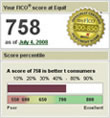Stop Writing Checks and Start Banking Online To Avoid Identity Theft
Published 8/7/08 (Modified 3/9/11)By MoneyBlueBook
Ask yourself this question - when was the last time you balanced your checkbook? Do you even know what balancing a���� checkbook entails? The fact of the matter is, writing checks and issuing payments in the form of paper checks is a steadily dying practice, thanks to the tremendous growth of the Internet and all of the new fangled technological advancements in the area of electronic and automated telephone banking (even phone banking is getting phased out in favor of the web). Much the same way the future of newspapers and the outlook of traditional forms of written news are being called into serious question, and much the same way they are being slowly rendered irrelevant by the overwhelming convenience and cost efficient benefits of the World Wide Web, so too will the practice of check writing and manually balancing accounts ultimately go the way of the dodo bird.
Personally, I can barely recall the last time I actually went through the hassle of balancing my checkbook manually. The tedious bean counting practice of manually comparing my own personal account records with the recordation information provided by monthly bank statements is simply not something I've readily adopted over the years. The last time was probably in high school when my mom sought to teach me about basic account management by forcing me to watch her go through the motion of recording transactions neatly on the gridded transaction register that comes with each set of checks. But other than that first initial
Read the full article » By MoneyBlueBook
By MoneyBlueBook